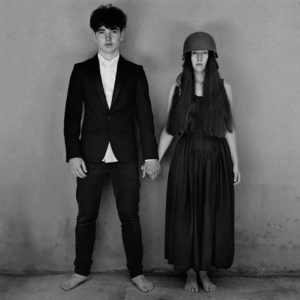 In non-BFS fashion, I’m going out on a limb and making a big statement I haven’t mulled over ad nauseum. In my cautious, middle child way, I like to settle into what I’m thinking and saying, but I felt compelled to make this leap after reading Jon Pareles’s review of U2’s most recent album release, Songs of Experience. Now, this is an article from The New York Times, so I know that the headline may not have been Mr. Pareles’s choice to go with his review. But the commentary in the title, “Cynicism Not Included,” just irks me. It sells this album short.
In non-BFS fashion, I’m going out on a limb and making a big statement I haven’t mulled over ad nauseum. In my cautious, middle child way, I like to settle into what I’m thinking and saying, but I felt compelled to make this leap after reading Jon Pareles’s review of U2’s most recent album release, Songs of Experience. Now, this is an article from The New York Times, so I know that the headline may not have been Mr. Pareles’s choice to go with his review. But the commentary in the title, “Cynicism Not Included,” just irks me. It sells this album short.
Does that mean I think the album is cynical? No, it’s more nuanced than that. The best characterization is given by the album’s title itself: it’s experienced. It’s seen how the world works, isn’t entirely happy about it, but has also seen and known hope.
Another limiting statement from the review: “The word ‘love,’ unironic and high-minded, recurs all over [the album].” I actually read this review before listening to the album, and this line made me fear that Bono had gone over the top (and even most fans of U2 can admit he has the tendency). But again, the album digs deeper than this superficial gloss of some of the song titles. Yes, the album opens with “Love Is All We Have Left,” but the tone and music used to go with those words is quiet, even tenuous. Nothing is certain about that statement in this context.
The album accelerates from there to “Lights of Home” (a delightfully bombastic follow-up) to the large, worn on your sleeve emotion of “You’re the Best Thing About Me.” Love is very much at the forefront of this song, but there are so many layers. There’s a bittersweetness to saying, “When the world is ours but the world is not your kind of thing, Full of shooting stars, brighter as they’re vanishing.” And my goodness, for a song so shouted, so anthemic to proclaim “You’re the best thing about me,” in its chorus, the closing lines of “Why am I walking away,” should make anyone pause and wonder. Looked at carefully, these lyrics could embrace love between spouses, friends, parents and children—not to mention much of the world’s response to the recent refugee crisis.
And if it isn’t clear from my description of the first three songs, this album’s music is excellent, U2 doing it right more than I have seen them do in years (and they haven’t been slouching in this department). This is why another part of the review by Pareles gives me pause. “It’s not an album that courts new fans by radically changing U2’s style; instead, it reaffirms the sound that has been filling arenas and stadiums for decades.”
There is some fairness to this, but again, it’s limiting. There are some purposeful callouts to earlier songs (Pareles notes one), but they’re at play with those older, familiar sounds. “Blackout,” the song Pareles notes has an echo of “Mysterious Ways,” promptly goes in a different direction after giving the listener that brief cue, as if a brief nod to long time fans. And the album’s final track, “13 (There Is a Light)” is in clear dialogue with and repeats some lyrics from “Song For Someone,” from their previous release, Songs of Innocence. In other words, it’s not just the band riffing on their greatest hits because they can’t do anything else.
I suppose you could also say there’s the continued, recognizable presence of Bono’s voice and The Edge’s guitar style. Still, criticism on that level can easily get silly, almost seeming to suggest that a band should find a new lead singer, get rid of its iconic guitarist, etc. At some level, a band is going to sound something like its constituent parts.
I’d say the review’s musical criticism is much more fair of U2’s previous release, Songs of Innocence. While I enjoy it and the clear experimentation it often shows (I don’t think Songs of Experience would have been possible without it), there are a few too many clear, in your face “U2 moments.” I love the aforementioned “Song for Someone,” but at the 2:15 mark, we get some crescendoing guitar that is a hallmark of U2’s style and it leaves me disappointed every time: we’ve been there before often enough.
While it’s certainly a U2 album, Songs of Experience simultaneously sounds different from anything else they have done before. The Edge lets his guitar work go places it hasn’t gone before, sometimes becoming more crunchy and rough, and generally avoiding his characteristic “U2 anthem,” approach. Adam Clayton’s always solid bass line often comes to the fore, which makes the mid-album “Summer of Love” an entirely different and memorable experience.
All of these elements, the layered lyrics and music, ebb and flow, carrying through from the start to the end of the album, making me put it among U2’s best. Does it feel a risk for this cautious Swede to say it, after only a few listens through? Yes, it does. But I also can’t escape how each of those listens have left me more excited than I have been by any of their albums since the 2000 release of All That You Can’t Leave Behind.
Suffice to say, it’s a risk I’m willing to take.
